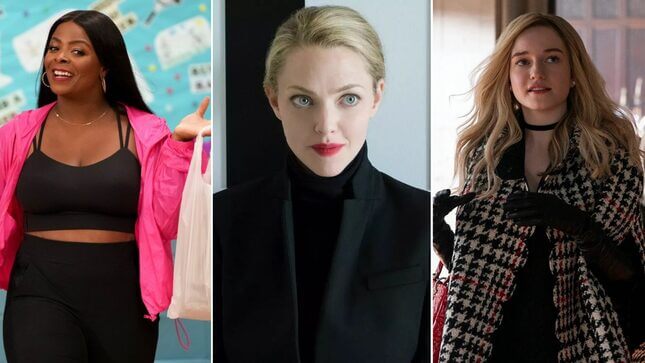Hollywood’s Best Punchline Is the ‘Girlboss’
Shows like Abbott Elementary and The Dropout center problematic, uncomfortably funny women leads—and reflect legitimate critiques of capitalist feminism.
EntertainmentTV

ABC’s Abbott Elementary became a smash hit overnight. Clips of Amanda Seyfried dancing to Lil Wayne as Elizabeth Holmes in The Dropout have gone viral. And we’re collectively addicted to Anna Sorokin’s swindling in Inventing Anna. Indeed, the season of wildly problematic—and equally entertaining—women leads is upon us, and these shows are united in their vicious, hilarious mockery of the once-venerated “girlboss” figure.
Of these shows, only Abbott Elementary is technically a comedy, but each is undeniably, compulsively funny—thanks to the often twisted and cringe-inducing humor of the possibly psychopathic women at the hearts of these shows. As a school principal, billionaire CEO, and faux millionaire heiress respectively, Ava of Abbott Elementary, Holmes in The Dropout, and Anna Sorokin in Inventing Anna, are prototypical renderings of the girlboss: pioneering, at least semi-powerful women who have paved their own ways in a capitalist and patriarchal society. It once seemed unthinkable that a girlboss-like figure would be the punchline of a popular television series—especially not in an ostensibly liberal entertainment industry that’s constantly striving toward more feminist storytelling and representation. Recent cultural shifts in how we understand gender and power have ultimately opened the door to the brutal comedy of these shows, as well as their massive followings.
“It’s this failed promise of, ‘put these women in charge of companies and that will lead to the elevation of all people within a certain class or gender,’ and we’ve seen that’s not true,” Samhita Mukhopadhyay, author of the forthcoming book The Myth of Making It on workplace diversity and the rise and fall of the girlboss, told Jezebel. Mukhopadhyay, who is also the former executive editor of Teen Vogue, has written extensively on the political developments that precipitated societal disillusionment with the hollow rhetoric of female capitalists. “The reality of girlbosses, whether the CEO of a company or political leader, is her life is made possible because of an underclass of working-class women, whether it’s her kids’ nanny, her driver, or whoever that might be.”
Abbott Elementary is a mockumentary reminiscent of The Office, set at an under-funded elementary school in Philly. Its premiere opens with its aspiring TikTok-influencer-principal Ava blowing much-needed funding on a mural of her face painted over the entrance of the titular Abbott Elementary. The mural is revealed shortly after she smiles at the cameras and sings, “I believe the children are the future.” Ava, portrayed by Janelle James, notably got the principal gig by blackmailing the superintendent after catching him cheating on his wife.
-

-

-

-

-

-

-

-

-

-

-

-

-

-

-

-

-

-

-

-

-

-

-

-

-

-

-

-

-

-

-

-

-

-

-

-

-

-

-

-








































